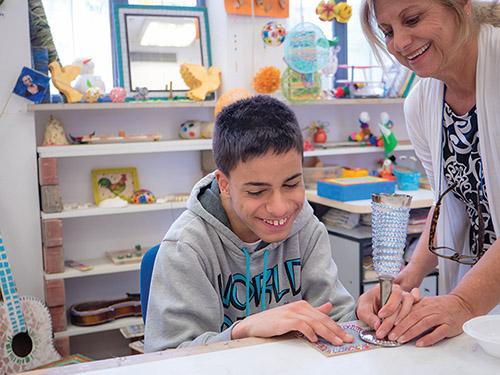

With the summer season now firmly in the rearview mirror, it is a good time to think back on all we have done over the past several months. Perhaps we recall the joy we experienced when we watched our children or grandchildren frolicking in the pool on a sweltering summer day. Maybe we recollect the breathtaking sunset we watched by the lake or the blue ocean waves breaking by the beach.
As we contemplate our summer experiences, we realize that so many of them relate to something we saw. For most of us, sight is a critical means to making memories we can cherish forever. However, what about those who are blind and visually impaired? How do they create memories without the gift of sight?
As difficult as it may be to comprehend, the lack of sight is not an impediment to making lasting memories. For example, at the Jerusalem Institute for the Blind (JIB), there are memories created every single day for individuals who refuse to let their sight deficiency hold them back.
Founded in 1902, the Jerusalem Institute for the Blind provides a wide range of educational, vocational, rehabilitative and health/social welfare resources for blind and visually impaired youth throughout Israel. From its state-of-the-art Jerusalem campus, JIB serves as a home, school, social outlet, sports center, respite provider, confidence builder and networking enabler for the many blind and visually impaired individuals in Israel, and it has been a fountain of hope and support for them as they find ways to compensate for the lack of sight.
JIB is a magical place where miraculous things occur daily. Visually impaired youth benefit immensely from being in a warm and engaging atmosphere that is wholly committed to helping the students grow in their learning, foster a sense of independence, and create a sense of self-confidence that is key to their long-term success. Although we may think it is the blind students who need help, JIB teaches them how to be the ones who help others.
There are an amazing array of programs and services that are offered by the Jerusalem Institute for the Blind in order to create a transformative experience for its students. These young heroes do not need sight in order to create memories. Everything they experience at the JIB is memorable and life-altering. In offering care and warmth, the skilled and sensitive staff leave an indelible mark on the students.
As we recall our summer experiences and fondly recall the memories we made and sights we enjoyed, we should take a moment to be grateful for what we have and appreciate that God gave us the gift of sight. We should also pause and consider how much of a blessing it is that even those young students in Israel who are deprived of sight are still able to live normal, healthy and meaningful lives through the use of technology and due to the love and support they are given at the Jerusalem Institute for the Blind.
Each morning we recite the bracha of Pokeach Ivrim: “Blessed are You, Hashem, our God, King of the universe, who gives sight to the blind.” We thank Hashem for giving us the gift of sight and enabling us to see. I often wonder, what about people who are blind or visually impaired? How can they say this bracha and express gratitude to God for giving them something they do not actually have?
I would posit that blind and visually impaired people are also given the gift of sight, albeit in a different way. They are granted the ability to imagine how things must look as they engage in various activities. Their experiences enable them to shine despite the darkness and to “see” things in a manner that sighted people are unable to envisage. For the blind and visually impaired children in Israel, that tremendous sense of accomplishment and self-worth when they become independent and contributing members of their community is something they will never forget. It’s at that moment that their ability to see things clearly is no different than ours.
By Leo Brandstatter
Leo Brandstatter is the executive director of the Jerusalem Institute for the Blind’s New York office. He can be reached at ny@jewishblind.org or at 212-532-4155.











